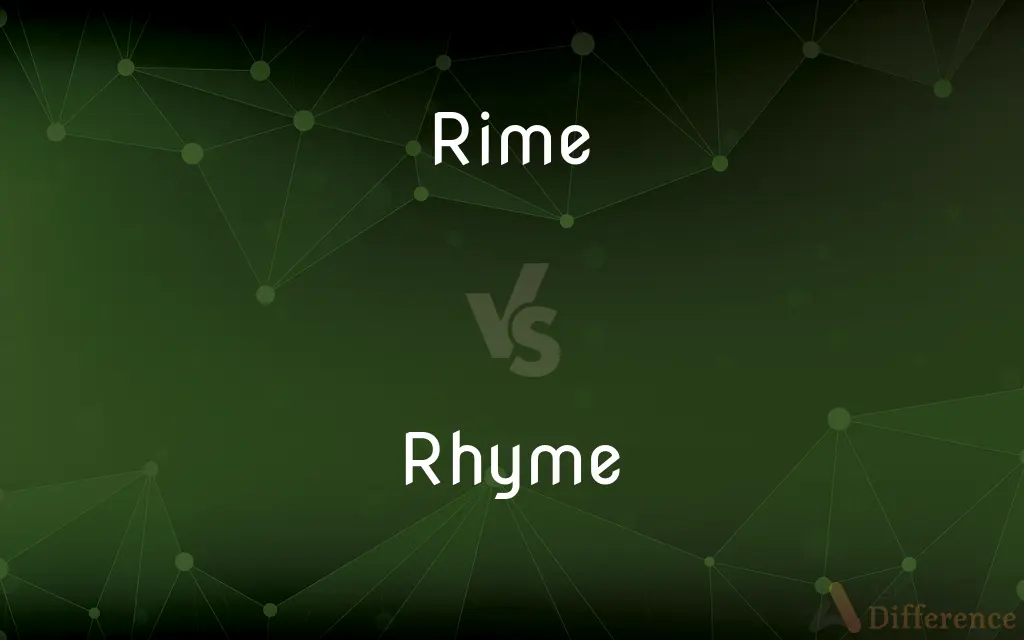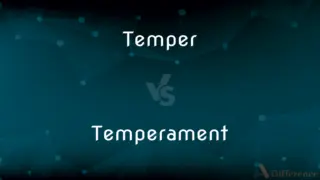Rime vs. Rhyme — What's the Difference?
By Maham Liaqat & Fiza Rafique — Updated on March 8, 2024
Rime refers to a frost formed on cold objects, whereas rhyme relates to the correspondence of sounds in words, especially at the ends of lines in poetry.

Difference Between Rime and Rhyme
Table of Contents
ADVERTISEMENT
Key Differences
Rime is a type of frost that forms in cold weather, characterized by its white, feathery crystals formed on surfaces. It occurs when water vapor in the air directly freezes upon coming into contact with a surface, typically in conditions of fog or mist combined with subfreezing temperatures. On the other hand, rhyme is a literary device used in poetry and song lyrics, involving the repetition of similar or identical sounds at the end of two or more words, most commonly at the ends of lines. Rhyming is a key aspect of many poetry forms, used to create rhythm, enhance aesthetic pleasure, or emphasize particular segments of text.
Rime is purely a meteorological phenomenon with no intrinsic relation to literature or language, except for its occasional use in poetic imagery to evoke the cold or describe wintry scenes. Whereas, rhyme is central to the craft of poetry and songwriting, serving various structural, mnemonic, and aesthetic functions. Rhymes can be categorized by their placement and nature, such as end rhymes, internal rhymes, and slant rhymes, each contributing differently to the rhythm and mood of a poem.
The formation of rime involves specific environmental conditions, including temperature, humidity, and the presence of a nucleation point. It is often observed on objects like branches, wires, or leaves, giving them a white, crystalline appearance that can be quite beautiful. Rhyme, by contrast, involves the manipulation of language, requiring a poet’s creativity to find and use words that sound similar and create a pleasing or meaningful effect when heard or read.
Rime can be seen as a natural indicator of weather conditions, particularly in mountainous or polar regions where it might influence decisions in activities such as skiing, mountaineering, and aviation. Rhyme plays a role in enhancing the memorability of verses, songs, and even commercial jingles, making it a tool for both artistic expression and practical communication.
Despite their phonetic similarity, rime and rhyme occupy entirely different spaces one in the natural world and the other in the realm of language arts. Their intersection is mostly confined to the poetic description of the former by the latter, highlighting the vast range of human experience from the environmental to the creative.
ADVERTISEMENT
Comparison Chart
Definition
Frost formation on cold objects.
Correspondence of sounds in words, especially at line ends.
Context
Meteorological.
Literary, especially in poetry and music.
Key Features
White, feathery crystals; requires subfreezing temps.
Sounds at word ends match; creates rhythm and harmony.
Function/Application
Indicator of specific weather conditions.
Enhances memorability and aesthetic of language.
Example of Use
Rime coating on trees signifies freezing fog.
Rhyming couplets used to emphasize points in a poem.
Compare with Definitions
Rime
A thin layer of ice that forms in freezing fog conditions.
Early morning joggers noticed the rime covering the park's fences.
Rhyme
The practice of ending lines of poetry with words that sound alike.
Classic poems often feature end rhymes for aesthetic effect.
Rime
White, feathery ice crystals attaching to surfaces.
The bench was covered in a delicate layer of rime.
Rhyme
A repetition of similar sounds in the final stressed syllables of two or more words.
The poem's scheme made use of slant rhyme to subtle effect.
Rime
A weather phenomenon indicating subfreezing temperatures.
The appearance of rime signaled the drop in temperature overnight.
Rhyme
A mnemonic device to aid memorization.
Children’s books frequently use rhyme to help young readers remember the story.
Rime
Frost formed on cold objects by the rapid freezing of water vapor.
The rime on the window pane created intricate patterns.
Rhyme
A tool in poetry and songs to create rhythm and harmony.
The songwriter’s use of rhyme added a catchy rhythm to the chorus.
Rime
The result of direct deposition of water vapor to ice.
Rime forms without the water first becoming liquid.
Rhyme
The correspondence of sound between words or the endings of words.
The rhyme between “time” and “sublime” brought the stanza together.
Rime
Frost formed on cold objects by the rapid freezing of water vapour in cloud or fog.
Rhyme
A rhyme is a repetition of similar sounds (usually, exactly the same sound) in the final stressed syllables and any following syllables of two or more words. Most often, this kind of perfect rhyming is consciously used for artistic effect in the final position of lines within poems or songs.
Rime
Archaic spelling of rhyme
Rhyme
Correspondence of sound between words or the endings of words, especially when these are used at the ends of lines of poetry
Poetic features such as rhythm, rhyme, and alliteration
Rime
Cover (an object) with hoar frost
He does not brush away the frost that rimes his beard
Rhyme
(of a word, syllable, or line) have or end with a sound that corresponds to another
Balloon rhymes with moon
Rime
Archaic spelling of rhyme
Rhyme
Correspondence of sounds at the ends of words or phrases, especially when involving the last stressed vowel and all succeeding sounds in each of two or more such words or phrases.
Rime
A white incrustation of ice formed when supercooled water droplets freeze almost instantly on contact with a solid surface.
Rhyme
A word that exhibits such correspondence with another, as behold and cold.
Rime
A coating, as of mud or slime, likened to a frosty film
"A meal couldn't leave us feeling really full unless it laid down a rime of fat globules in our mouths and stomachs" (James Fallows).
Rhyme
A poem or verse employing such correspondence as a formal feature, especially at the ends of lines.
Rime
Variant of rhyme.
Rhyme
Poetry or verse of this kind.
Rime
To cover with or as if with frost or ice
"heavy [shoes] rimed with mud and cement ... from the building site" (Seamus Deane).
Rhyme
To form a rhyme.
Rime
(meteorology) Ice formed by the rapid freezing of cold water droplets of fog on to a cold surface.
Rhyme
To compose rhymes or verse.
Rime
(meteorology) A coating or sheet of ice so formed.
Rhyme
To make use of rhymes in composing verse.
Rime
A film or slimy coating.
Rhyme
To put into rhyme or compose with rhymes.
Rime
Rhyme.
Samuel Taylor Coleridge wrote The Rime of the Ancient Mariner in the 18th century.
Rhyme
To use (a word or words) as a rhyme.
Rime
(linguistics) The second part of a syllable, from the vowel on, as opposed to the onset.
Rhyme
Rhyming verse (poetic form)
Rime
A step of a ladder; a rung.
Rhyme
A thought expressed in verse; a verse; a poem; a tale told in verse.
Rime
(obsolete) A rent or long aperture; a chink, fissure, or crack.
Rhyme
(countable) A word that rhymes with another.
Rime
To freeze or congeal into hoarfrost.
Rhyme
A word that rhymes with another, in that it is pronounced identically with the other word from the vowel in its stressed syllable to the end.
Rime
Obsolete form of rhyme#Verb
Rhyme
(uncountable) Rhyming: sameness of sound of part of some words.
Rime
A rent or long aperture; a chink; a fissure; a crack.
Rhyme
(linguistics) rime
Rime
White frost; hoarfrost; congealed dew or vapor.
The trees were now covered with rime.
Rhyme
(obsolete) Number.
Rime
A step or round of a ladder; a rung.
Rhyme
(ambitransitive) To compose or treat in verse; versify.
Rime
Rhyme. See Rhyme.
Rhyme
Of a word, to be pronounced identically with another from the vowel in its stressed syllable to the end.
Rime
To freeze or congeal into hoarfrost.
Rhyme
(reciprocal) Of two or more words, to be pronounced identically from the vowel in the stressed syllable of each to the end of each.
Rime
To rhyme. See Rhyme.
Rhyme
To somewhat resemble or correspond with.
Rime
Ice crystals forming a white deposit (especially on objects outside)
Rhyme
To number; count; reckon.
Rime
Correspondence in the sounds of two or more lines (especially final sounds)
Rhyme
An expression of thought in numbers, measure, or verse; a composition in verse; a rhymed tale; poetry; harmony of language.
A ryme I learned long ago.
He knewHimself to sing, and build the lofty rime.
Rime
Be similar in sound, especially with respect to the last syllable;
Hat and cat rhyme
Rhyme
Correspondence of sound in the terminating words or syllables of two or more verses, one succeeding another immediately or at no great distance. The words or syllables so used must not begin with the same consonant, or if one begins with a vowel the other must begin with a consonant. The vowel sounds and accents must be the same, as also the sounds of the final consonants if there be any.
For rhyme with reason may dispense,And sound has right to govern sense.
Rime
Compose rhymes
Rhyme
Verses, usually two, having this correspondence with each other; a couplet; a poem containing rhymes.
Rhyme
A word answering in sound to another word.
Rhyme
To make rhymes, or verses.
There marched the bard and blockhead, side by side,Who rhymed for hire, and patronized for pride.
Rhyme
To accord in rhyme or sound.
And, if they rhymed and rattled, all was well.
Rhyme
To put into rhyme.
Rhyme
To influence by rhyme.
Hearken to a verser, who may chanceRhyme thee to good.
Rhyme
Correspondence in the sounds of two or more lines (especially final sounds)
Rhyme
A piece of poetry
Rhyme
Compose rhymes
Rhyme
Be similar in sound, especially with respect to the last syllable;
Hat and cat rhyme
Common Curiosities
What is rime?
Rime is a type of frost that forms on cold objects when water vapor in the air freezes upon contact.
Is rime always white?
Rime is typically white because it is composed of tiny ice crystals that scatter light.
What is rhyme used for in poetry?
Rhyme is used in poetry to create rhythm, enhance harmony, and sometimes to make text more memorable.
Are all rhymes at the end of lines?
While end rhymes are common, rhymes can also occur within lines (internal rhyme) or even with imperfect sound matches (slant rhyme).
Does rime have any practical uses?
While mostly a natural curiosity, rime can indicate specific weather conditions valuable for certain outdoor activities.
Can rime form on any surface?
Rime can form on any cold surface under the right conditions of temperature and humidity.
Can rime damage plants or structures?
Rime itself is relatively harmless but can indicate conditions that might be harmful to sensitive plants or cause other weather-related issues.
Can rhyme occur in prose?
Yes, rhymes can be found in prose, especially in prose poetry or to add a poetic quality to narrative text.
Why is rhyme important in songs?
Rhyme helps to create a catchy or memorable rhythm in songs, aiding in listener engagement and recall.
How do poets choose words to rhyme?
Poets select words that sound alike in their ending syllables and fit the meaning and rhythm of their work.
Is rime ice the same as snow?
No, rime ice forms from vapor, while snow is formed from water droplets that freeze into ice crystals in clouds.
What differentiates rime from other types of frost?
Rime specifically forms in foggy conditions, rapidly freezing as water vapor contacts a cold surface, different from frost that forms from dew.
How do rhymes affect the mood of a poem?
Rhymes can enhance the mood by reinforcing themes, creating a playful tone, or invoking a solemn or serious atmosphere.
Can rime be predicted in weather forecasts?
Yes, rime can be predicted when the forecast includes freezing fog or mist in cold conditions.
What are some examples of rhyme schemes?
Examples include the simple ABAB or AABB, and more complex schemes like the sonnet’s ABABCDCDEFEFGG.
Share Your Discovery

Previous Comparison
Inn vs. Tavern
Next Comparison
Temper vs. TemperamentAuthor Spotlight
Written by
Maham LiaqatCo-written by
Fiza RafiqueFiza Rafique is a skilled content writer at AskDifference.com, where she meticulously refines and enhances written pieces. Drawing from her vast editorial expertise, Fiza ensures clarity, accuracy, and precision in every article. Passionate about language, she continually seeks to elevate the quality of content for readers worldwide.
















































